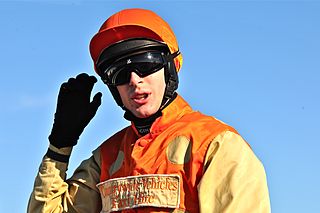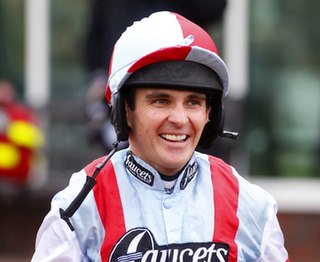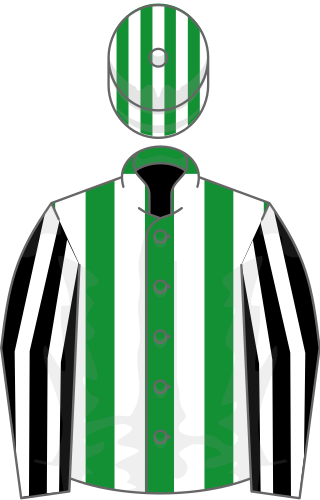Related Research Articles

The Grand National is a National Hunt horse race held annually at Aintree Racecourse in Aintree, Merseyside, England. First run in 1839, it is a handicap steeplechase over an official distance of about 4 miles and 2½ furlongs, with horses jumping 30 fences over two laps. It is the most valuable jump race in Europe, with a prize fund of £1 million in 2017. An event that is prominent in British culture, the race is popular amongst many people who do not normally watch or bet on horse racing at other times of the year.

William John Hartack Jr., born in Colver, Pennsylvania, was a Hall of Fame jockey. Colver is in the northwestern part of Cambria Township, 7 miles (11 km) northwest of Ebensburg, the county seat.
Aldaniti was a racehorse who won the Grand National on 4 April 1981. His jockey on that day, Bob Champion, had recovered from cancer, while Aldaniti had recovered after suffering a career-threatening injury. The horse was trained by Josh Gifford.
George Matthew Ede was an English first-class cricketer and a Grand National winning jockey. A founding member of Hampshire County Cricket Club, he was the club's first captain from 1864 to 1869. In horse racing, he was one of the most successful amateur riders of his age, winning 306 races, including the 1868 Grand National. He was killed two years later from injuries sustained in the 1870 Grand National.
Foinavon (1958–1971) was an Irish racehorse. He won the Grand National in 1967 at odds of 100/1 after the rest of the field fell, refused or were hampered or brought down in a mêlée at the 23rd fence. The fence was officially named after Foinavon in 1984.
John Geoffrey Tristram Lawrence, 4th Baron Trevethin and 2nd Baron Oaksey was a British aristocrat, horse racing journalist, television commentator and former amateur jockey. He was twice British Champion Amateur Jump Jockey, before becoming a celebrated journalist and recognisable racing personality both on television and through his charitable work for the Injured Jockeys Fund, which he helped establish. He has been described as "quite possibly the outstanding racing figure of modern times, touching so many via his compelling writing, broadcasting, race-riding and tireless fund-raising".

Timothy James Murphy, known as Timmy Murphy, is a retired Irish jockey who competed mostly in National Hunt racing. A multiple Grade 1-winning rider, he is best known for his victory on Comply or Die in the 2008 Grand National. He overcame problems with alcohol, which had led to a prison sentence after a drunken incident on a plane in 2002, to resume a successful career and win the 2005 jump jockey of the year Lester Award. He won the Irish Grand National on Davids Lad in 2001, and the Scottish Grand National on Merigo in 2010 and 2012. He had eight winners at the Cheltenham Festival, the first in 1997 and the last in 2009. He recorded his 1000th win in Britain in 2010. Following an injury in a fall in 2010 he was unable to regain his licence to ride over jumps and switched codes, riding on the flat from 2015 until 2018, when he retired from race riding.
Brian Fletcher was an English jockey known for riding the horse Red Rum to win the Grand National in 1973 and 1974 and for second place in 1975. He first won the Grand National at the age of 20, in 1968 riding Red Alligator.
Lord Gyllene was a New Zealand-bred racehorse whose greatest victory came in the 1997 Grand National at Aintree. He was trained by Steve Brookshaw for owner Sir Stanley Clarke CBE and ridden by Tony Dobbin. Lord Gyllene was retired by his owner in 2001 due to injury. He had a race record in the UK of 13 runs: won 4, second 5 and third once, as well as two wins from 23 starts in New Zealand. His final appearance in his homeland was a winning one, in a steeplechase at Te Rapa racecourse in Hamilton on 16 September 1995. That followed his second at Ellerslie to one of the great jumpers in New Zealand racing history, Sydney Jones, in the Pakuranga Hunt Cup, one of New Zealand's most prestigious jumping races.

Aidan Coleman is a retired Irish National Hunt jockey. During a seventeen-year career based in Great Britain, he rode four winners at the Cheltenham Festival and a total of 13 Grade 1 winners. In June 2023 he sustained a serious leg injury in a fall at Worcester and was unable to return to race-riding. He announced his retirement on medical advice in April 2024.

Liam Treadwell was an English National Hunt jockey, who won over 300 races between 2009 and 2019. He won the 2009 Grand National on Mon Mome at odds of 100/1, and also won the United House Gold Cup, Byrne Group Plate, and Grand Sefton Steeplechase races.

Davy Russell is an Irish retired National Hunt jockey. He was Irish jump racing Champion Jockey three times, and won the Grand National (twice), the Cheltenham Gold Cup and the Grand Steeple-Chase de Paris.
Tommy Carberry was an Irish jockey who rode mostly in National Hunt races. He was Irish jump racing Champion Jockey four times. He is best known for winning the 1975 Grand National on L'Escargot. He rode a total of 16 Cheltenham Festival winners, including L'Escargot in the 1970 and 1971 Gold Cup and Ten Up in the 1975 Gold Cup. After retiring from race riding in 1982 he became a trainer and in 1999 saddled the winner of the Grand National, Bobbyjo.

The 1997 Grand National was the 150th official running of the Grand National steeplechase held at Aintree near Liverpool. The race was scheduled to be run on Saturday 5 April 1997, but was postponed by two days to Monday 7 April after a Provisional Irish Republican Army (IRA) bomb threat forced the evacuation of the course.
The 1930 Grand National was the 89th renewal of the Grand National horse race that took place at Aintree Racecourse near Liverpool, England, on 29 March 1930.
Woore Racecourse was an English National Hunt horse racing venue, situated in the village of Woore, in the northernmost corner of Shropshire, on the border with Cheshire and Staffordshire.

Captain Timothy Arthur Forster, OBE commonly known as Tim Forster, was an English racehorse trainer and previously an amateur jockey. As a trainer he had 1,346 winners, including 3 Grand Nationals at Aintree in Liverpool. Forster's last runner as a Licensed Trainer came on 30 May 1998, when he won with Albermarle in a novice chase at Market Rasen.
John Buckingham was an English National Hunt jockey, best known for riding Foinavon to victory in the 1967 Grand National.
Bryony Frost is an English National Hunt jockey from Buckfastleigh, Devon. In 2019 she became the first female jockey to win a Grade 1 race at the Cheltenham Festival.
Hewick is an Irish-bred and trained Thoroughbred racehorse who races under National Hunt rules. He is a specialist long-distance steeplechaser known for his victories in the 2022 American Grand National and 2023 King George VI Chase.
References
- ↑ "Top jockeys, a National winner, big crowds... remembering Woore 50 years after it closed". The Racing Post . 3 June 2013.
- ↑ Tim Brookshaw, The Times, 9 November 1981, p. 12
- 1 2 John Oaksey 2003 Mince Pie for Starters
- ↑ Brookshaw returns to train first winner, The Times, 7 March 1967, p. 6
- ↑ "Racing's man of courage dies". Shropshire Star. 9 November 1981. p. 3.
- ↑ Shropshire Star, 10 November 1981, Death notice, page 2.